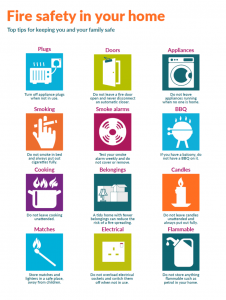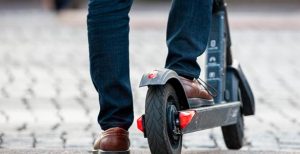How to prevent common fires in the home

Cook Safely
- Take extra care if you need to leave the kitchen whilst cooking, take pans off the heat or turn them down to avoid risk.
- Avoid cooking when under the influence of alcohol.
- Avoid leaving children in the kitchen alone when cooking on the hob. Keep matches and sauce pan handles out of their reach to keep them safe.
- Make sure saucepan handles don’t stick out – so they don’t get knocked off the stove.
- Take care if you’re wearing loose clothing – they can easily catch fire.
- Keep tea towels and cloths away from the cooker and hob.
- Spark devices are safer than matches or lighters to light gas cookers, because they don’t have a naked flame.
- Double check the cooker is off when you’ve finished cooking
Take care with electrics
- Keep electrics (leads and appliances) away from water.
- Don’t put anything metal in the microwave.
- Check toasters are clean and placed away from curtains and kitchen rolls.
- Keep the oven, hob and grill clean and in good working order. A build-up of fat and grease can ignite a fire.
Deep fat frying
- Take care when cooking with hot oil – it sets alight easily.
- Make sure food is dry before putting it in hot oil so it doesn’t splash.
- If the oil starts to smoke – it’s too hot. Turn off the heat and leave it to cool.
- Use a thermostat controlled electric deep fat fryer. They can’t overheat.
How to avoid electrical fires
- Always check that you use the right fuse to prevent overheating.
- Make sure an electrical appliance has a British or European safety mark when you buy it.
- Certain appliances, such as washing machines, should have a single plug to themselves, as they are high powered.
- Try and keep to one plug per socket.
- When charging electrical goods, follow the manufacturer’s instructions and look for the CE mark that indicates chargers comply with European safety standards.
- An extension lead or adaptor will have a limit to how many amps it can take, so be careful not to overload them to reduce the risk of a fire.
- Appliances use different amounts of power – a television may use a 3amp plug and a vacuum cleaner a 5amp plug for example. Know the limit!
- Keep electrical appliances clean and in good working order to prevent them triggering a fire.
- Keep your eyes peeled for signs of dangerous or loose wiring such as scorch marks, hot plugs and sockets, fuses that blow or circuit-breakers that trip for no obvious reasons, or flickering lights.
- Check and replace any old cables and leads, especially if they are hidden from view – behind furniture or under carpets and mats.
- Unplugging appliances helps reduce the risk of fire.
- Unplug appliances when you’re not using them or when you go to bed.
Furniture
Always ensure that your furniture has the fire-resistant permanent label.
Portable heaters
- Try to secure heaters up against a wall to stop them falling over.
- Keep them clear from curtains and furniture and never use them for drying clothes.
Using an electric blanket
- Store electric blankets flat, rolled up or loosely folded to prevent damaging the internal wiring.
- Unplug blankets before you get into bed, unless it has a thermostat control for safe all-night use.
- Try not to buy second hand blankets and check regularly for wear and tear.
- Always follow the manufacturer’s instructions.
Cigarettes
- Stub cigarettes out properly and dispose of them carefully. Put them out. Right out!
- Never smoke in bed.
- Smoke outdoors and put cigarettes right out – this is safer than smoking indoors.
- Use a proper ashtray – never a wastepaper basket.
- Make sure your ashtray can’t tip over and is made of a material that won’t burn.
- Don’t leave a lit cigarette, cigar or pipe lying around. They can easily fall over and start a fire.
- The best way to reduce the risk is to make an attempt to quit, using NHS support if you need it. If you do not want to quit, consider vaping.
- Take extra care if you smoke when you’re tired, taking prescription drugs, or if you’ve been drinking. You might fall asleep and set your bed or sofa on fire.
- Unplug e-cigarettes when fully charged and ensure you are using the correct charger.
- Never smoke illegally manufactured cigarettes.
Candles
- Make sure candles are secured in a proper holder and away from materials that may catch fire – like curtains.
- Put candles out when you leave the room, and make sure they’re put out completely at night.
- Children shouldn’t be left alone with lit candles.
- Consider using LED or battery-operated candles.
- Keep pets away from lit candles.
- Keep matches and lighters out of children’s reach.
- Only buy child resistant lighters and match boxes.
Taken from : Fire safety in the home (accessible version)









